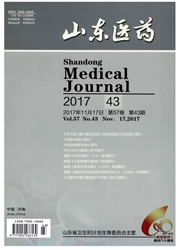

 中文摘要:
中文摘要:
目的探讨NBD多肽对小鼠移植心脏存活时间的影响及机制。方法以BALB/c小鼠为供体、C57BL/6小鼠为受体,采用Cuff技术建立小鼠颈部异位心脏移植模型。随机分为对照组及NBD多肽组,各9只。NBD多肽组于心脏移植术中和术后第2、3天全身给予NBD多肽600μg/d,而对照组仅给予等体积PBS0.2ml。记录移植心脏存活时间,排斥反应程度,用混合淋巴细胞反应(MLR)测定受者脾脏T细胞对供者同种抗原的反应性。ELISA法测定受者血清肿瘤坏死因子(TNF)-α、干扰素(INF)-γ和白细胞介素(IL)-12。免疫组化法检测移植心脏NF-κB。结果NBD多肽组移植心脏存活(14.17±2.93)d,与PBS对照组的(7.00±1.41)d相比,P〈0.01。NBD多肽组排斥反应分级降低,诱导受者脾脏T细胞的抗原特异性低反应性,受者小鼠血清Th1型细胞因子(TNF-α、INF-γ和IL-12)水平显著降低(P均〈0.01),移植心脏NF-κB的表达下调。结论NBD多肽能有效抑制小鼠心脏移植排斥反应,使同种异体的心脏移植存活时间延长。其机制可能与诱导受者T细胞的抗原特异性低反应性及抑制Th1型细胞因子分泌有关。
 英文摘要:
英文摘要:
Objective To investigate the impact and mechanisms of NBD-peptide on mouse heart allografts survival time. Methods The cervical heterotopic heart transplantation model was established with Cuff technique and the animals were divided into control group and NBD-peptide group. In NBD-peptide group, NBD-peptide 600 μg/d were given during the operation and after the second, third day. whereas PBS 0. 2 ml were given in control group. The cardiac allograft survival time was observed, Pathological analysis were performed. The responsiveness of the recipient spleen T cell to the donor alloantigen was detected by mixed lymphocyte reaction (MLR). The cardiac transplantation were detected by immunohistochemistry. Results The cardiac allograft survival time of the NBD-Peptide group was longer than PBS treated group ( 14. 17 ±2. 93) days vs ( 7.00 ± 1.41 ) days ( P 〈 0. 01 ). Pathological grade of rejection was significantly lower. The NBD-Peptide induced alloantigen-specific T-cell hypo-responsiveness. In the NBD-Peptide group, the levels of IL-12, IFN-γ and TNF-α in the serum decreased significantly ( P 〈 0. 01 ). Conclusions The injection of the NBD-Peptide can prolong survival time of heart allografts. The induction of recipient T-cell hypo-responsiveness and inhibition of Thl cytokines secretion may play important roles on prolonging survival time of heart allografts.
 同期刊论文项目
同期刊论文项目
 同项目期刊论文
同项目期刊论文
 期刊信息
期刊信息
